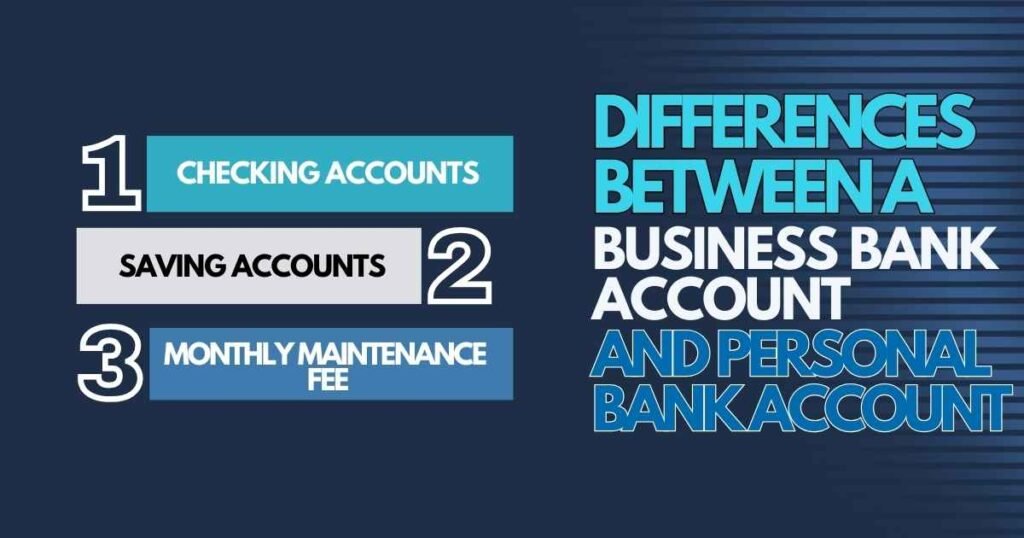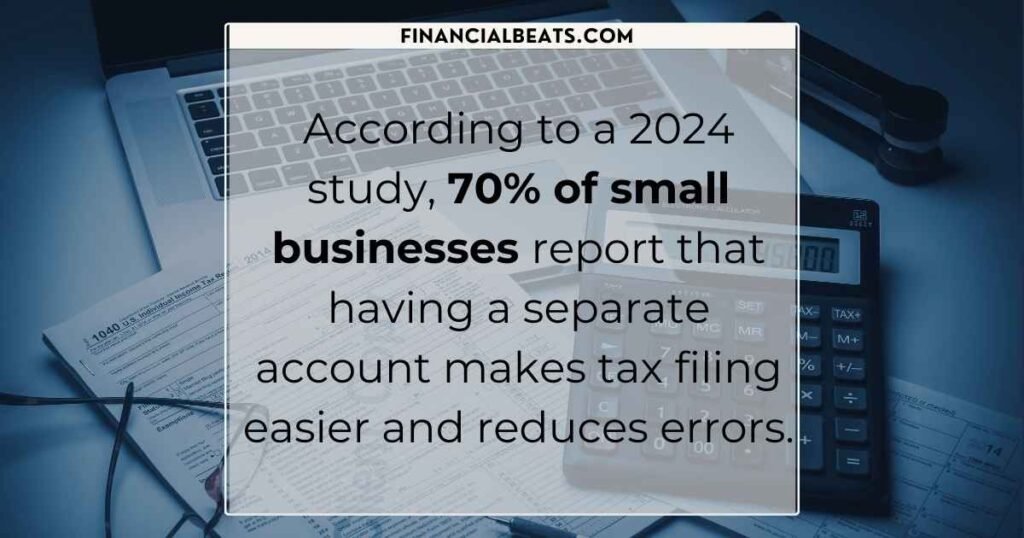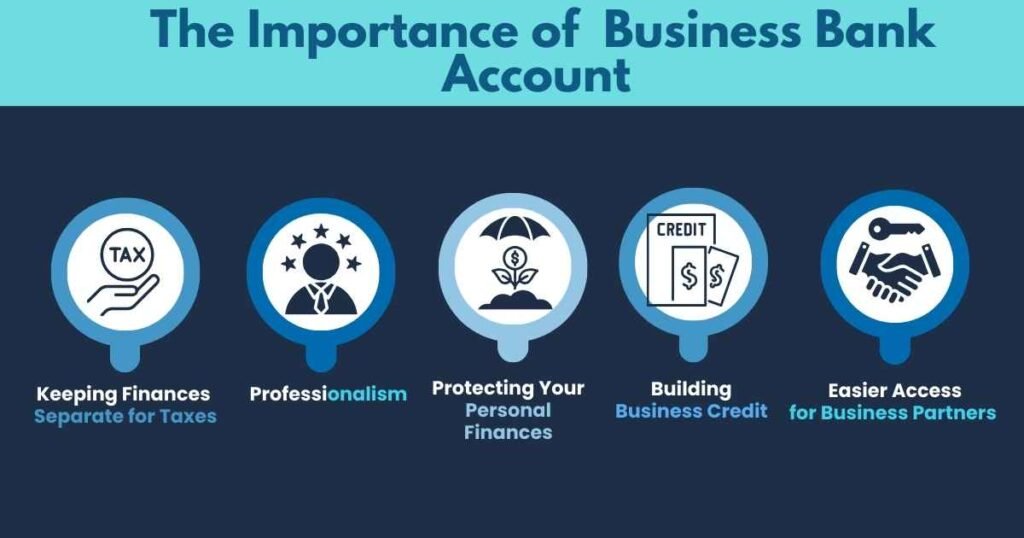Are you mixing your personal and business finances in one bank account? It might seem convenient, but it could lead to big problems down the road.
Combining personal and business finances can cause issues, especially during an IRS audit. Many business owners make the mistake of using one account for both. But what’s the difference between business and personal bank accounts? Which should you choose?
Differences Between a Business Bank Account and Personal Bank Account

A business bank account is specifically designed for business use, helping businesses keep track of their finances. If you run a small business, having a separate account can make it easier to manage your business money separately from your personal funds.
These accounts are meant only for business activities, such as making purchases for your business. This keeps business money separate from personal money. Business accounts can include both checking and savings accounts, just like personal ones, but they are tailored to meet the needs of a business.
1. Checking Accounts
Business and personal checking accounts function similarly, allowing you to manage everyday banking activities like withdrawals, checks, and debit card payments. The key difference is that a business account is solely for work-related transactions, helping you clearly separate business and personal finances.
This separation makes it easier to track expenses and income, especially when reviewing statements or preparing taxes. Fees also differ—personal checking accounts often have lower or no fees, while business accounts typically have higher fees and stricter requirements to avoid them. In 2024, business accounts averaged $15-$20 in monthly fees, compared to $5-$10 for personal accounts.
2. Savings Accounts
A business savings account works much like a personal savings account, where you set aside money for future needs.
Both types of savings accounts help you keep your money safe while earning interest, meaning your balance can grow over time. In 2024, average interest rates for savings accounts will range from 0.5% to 4%, depending on the bank and account type. The more money you save and the better the interest rate, the more your savings will increase.
Savings accounts can also help in case of overspending. If your business checking account runs out of funds, your savings account can cover the difference, avoiding expensive overdraft fees, which in 2024 can cost between $30 to $40 per transaction on average.
3. Monthly Maintenance Fee
Business checking accounts usually have higher fees than personal accounts. The exact fee you pay each month depends on the bank or credit union you choose, but there are ways to avoid these costs.
When opening a business account, ask how you can skip paying fees. Common ways include keeping a minimum balance, using your business debit card often, or setting up direct deposits. For example, in 2024, studies show that around 70% of business accounts can avoid monthly fees by meeting these conditions.
Some banks even offer free business accounts, but these typically come with stricter requirements. It’s always best to check the specific rules of the bank or credit union before opening a business account.
Which One is Better BBA or PBA?

It’s usually smart to keep your business finances separate from personal ones. The IRS Deciding between a Business Bank Account (BBA) and a Personal Bank Account (PBA) depends on your needs. If you are running a business, a BBA is generally the better option because it keeps your personal and business finances separate.
This separation can simplify accounting, help you during tax season, and boost your business’s credibility. BBAs also often offer features tailored to businesses, like payment processing and better loan options. On the other hand, a PBA may be suitable if you are just managing personal finances. However, using a PBA for business can complicate record-keeping, create tax issues, and limit growth opportunities.
According to a 2024 study, 70% of small businesses report that having a separate account makes tax filing easier and reduces errors. Besides tax advantages, a business account can offer perks like easier bookkeeping, better business credibility, and potential loan opportunities.
Can You Use a Personal Account as a Business Account?
If you run a sole proprietorship, meaning you’re the only person in your business and it’s not a separate legal entity, you can use your personal bank account for business purposes. It’s not required to have a special business account; it’s your choice.
However, if your business is a corporation or an LLC, you can’t use your personal account. The law requires you to have a separate business account because these types of businesses are considered separate legal entities. This means you need to keep your business finances separate from your personal money.
You can open a business account at the same bank where you have your personal account, but it must be in your company’s name. The funds in this account should only be used for business-related expenses, not mixed with your personal funds.
The Importance of Business Bank Account

Even if you’re not legally required to open a business bank account, it still brings a lot of benefits over using a personal one:
1. Keeping Finances Separate for Taxes
Having a separate business account is important for easily tracking income and expenses. It gives you a clear view of how much your business is making and spending, which helps with budgeting and planning. When all business transactions are in one account, it’s easier to categorize them and avoid mixing personal and business expenses. This separation reduces confusion and makes bookkeeping more accurate.
During tax season, having organized records saves time and effort. You won’t have to sift through personal transactions to find business-related ones, which simplifies the process of claiming deductions and ensures compliance.
According to a 2024 report, 65% of small businesses say separating finances reduces accounting errors and stress during tax filing.
2. Professionalism
A business account not only adds professionalism but also makes transactions smoother and more trustworthy. When clients see payments, invoices, or checks under your business name, it signals that your company is legitimate and established. This can be especially important when building relationships with new customers, who might be more hesitant to work with someone using a personal account.
Moreover, having a business account allows you to brand your payments and financial documents with your company’s logo and name. This creates a consistent, professional image that can enhance your business’s reputation.
According to a 2024 survey, 72% of customers said they are more likely to trust and do business with a company that has clear and professional financial practices. In the competitive business world, this added credibility can set you apart from others who mix personal and business finances.
3. Protecting Your Personal Finances
If you run a corporation or LLC, keeping your personal and business finances separate is vital to protect your personal assets from business debts and lawsuits. For example, if your business faces legal trouble or owes money, your personal savings, home, and other assets are safe as long as you maintain a clear separation. This concept, known as “limited liability,” is one of the key reasons business owners choose to form an LLC or corporation.
Even if you’re a sole proprietor, using a business account still adds a layer of protection. In case of fraud, hacking, or errors, only your business funds are at risk. Plus, your business account is insured by the FDIC (up to $250,000), meaning you’re covered even if something goes wrong.
Mixing personal and business funds could also lead to “piercing the corporate veil,” a legal situation where courts might hold you personally liable if they see that you haven’t kept finances separate. This risk is reduced when you keep business transactions within a dedicated account.
4. Building Business Credit
A separate business account allows your company to build its own credit history, separate from your personal credit. This can help you qualify for business loans and credit cards.
According to a 2024 survey, 70% of businesses that maintain separate accounts find it easier to access credit. With better business credit, you can finance growth opportunities without affecting your personal credit score.
5. Easier Access for Business Partners
A business account lets you add partners or authorized signers, giving them access to manage finances without mixing in personal funds. This setup is ideal for smooth collaboration and ensures that your business finances remain independent from personal ones.
Final Thoughts
Having a separate bank account for your business is important for clear financial management. It keeps personal and business funds apart, making tax filing easier and more organized. It also builds professionalism, protects personal assets, and helps establish business credit, which can lead to loans and financial tools for growth. Overall, separating finances simplifies management, protects assets, and supports long-term success.
FAQs
Are business bank accounts different from personal accounts?
Yes, business bank accounts are different from personal accounts. They are specifically designed to manage business finances, offering features like multiple signers, payroll processing, and better access to business loans and credit lines. They also help separate personal and business expenses for easier tax management.
What are the differences between personal banking and business banking?
The key differences between business and personal bank accounts are in their features and uses. Business accounts offer tools like invoicing, employee access, and higher transaction limits, but often come with higher fees and extra services like payroll management. Personal accounts are simpler, meant for everyday banking like basic transactions and savings, without the specialized tools businesses need.
Why is a business account better than a personal account?
A business account is better because it keeps your business and personal bank accounts separate, which helps with tax reporting and protects your personal assets. It also builds business credibility and allows you to establish business credit, making it easier to get loans and credit cards.
Can I use a business account for personal use?
Technically, you can, but it’s not recommended. Mixing personal and business finances can create accounting headaches, complicate taxes, and even lead to legal issues, especially if you run a corporation or LLC. Keeping them separate is important for financial clarity and legal protection.
